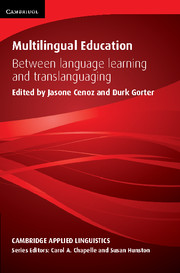Book contents
- Frontmatter
- Contents
- List of contributors
- Series editors’ preface
- Acknowledgements
- 1 Towards a holistic approach in the study of multilingual education
- 2 L1 as a pedagogical resource in building students’ L2 academic literacy: pedagogical innovation in the science classroom in a Hong Kong school
- 3 Linking content, linking students: a cross-linguistic pedagogical intervention
- 4 The role of the native language in the literacy development of Latino students in the United States
- 5 A nexus analysis of code choice during study abroad, and implications for language pedagogy
- 6 Multilingual practices in foreign language study
- 7 Language choices and ideologies in the bilingual classroom
- 8 Communicative repertoires in the community language classroom: resources for negotiating authenticity
- 9 Complementary classrooms for multilingual minority ethnic children as a translanguaging space
- 10 Constructing in-between spaces to ‘do’ bilingualism: a tale of two high schools in one city
- 11 Becoming multilingual and being multilingual: some thoughts
- Index
6 - Multilingual practices in foreign language study
Published online by Cambridge University Press: 17 September 2021
- Frontmatter
- Contents
- List of contributors
- Series editors’ preface
- Acknowledgements
- 1 Towards a holistic approach in the study of multilingual education
- 2 L1 as a pedagogical resource in building students’ L2 academic literacy: pedagogical innovation in the science classroom in a Hong Kong school
- 3 Linking content, linking students: a cross-linguistic pedagogical intervention
- 4 The role of the native language in the literacy development of Latino students in the United States
- 5 A nexus analysis of code choice during study abroad, and implications for language pedagogy
- 6 Multilingual practices in foreign language study
- 7 Language choices and ideologies in the bilingual classroom
- 8 Communicative repertoires in the community language classroom: resources for negotiating authenticity
- 9 Complementary classrooms for multilingual minority ethnic children as a translanguaging space
- 10 Constructing in-between spaces to ‘do’ bilingualism: a tale of two high schools in one city
- 11 Becoming multilingual and being multilingual: some thoughts
- Index
Summary
Introduction: the paradox of the foreign language classroom in an age of globalization
The teaching and learning of foreign languages at secondary and postsecondary institutions around the world is confronted with a major paradox. On the one hand, mindful of their mission to teach the national language, literature and culture of a given national speech community, teachers strive to impart a mastery of the standard language that will enable learners to become educated users of the language, to communicate with native speakers and to read the literature written by and for native speakers. On the other hand, as global communications have become more and more multimodal and multilingual, and potential interlocutors are not necessarily monolingual native nationals but other multilingual non-native speakers, foreign language learners have to learn, as the 2007 Report of the Modern Language Association advocates, how to ‘operate between languages’ (MLA, 2007 : 237), that is, how to develop a linguistic and cultural competence across multilingual contexts. While this multilingual imperative has been theorized recently by applied linguists such as Makoni and Pennycook ( 2007 ), Peter Auer and Li Wei ( 2007 ) and Canagarajah ( 2007 ) and has been the theme of a special issue of the Modern Language Journal on multilingualism (Cenoz and Gorter, 2011 ), it has not yet been taken seriously by foreign language teachers in departments of foreign languages and literatures at educational institutions. The exclusive use of monolingual/national points of reference deprives the learners of the transnational, translingual and transcultural competencies they will need to use the language in today's multilingual environments.
The teaching of foreign languages still bears the traces of its historical antecedents in the teaching of classical Greek and Latin – prestige languages that in the nineteenth century contributed to the well-rounded education of national elites. The inclusion of living foreign languages into the academic curriculum in the early twentieth century coincided with a surge in nationalism among industrialized nations and with increased contacts, both touristic and commercial, across national borders. Following Benedict Anderson's notion of ‘imagined communities’ ( 1983 ), foreign languages, like nations, were imagined as belonging to clearly defined national communities of native speakers, as limited by clearly defined grammatical borders and as strictly policed by the standard rules of usage found in a nation's grammars and dictionaries.
- Type
- Chapter
- Information
- Multilingual EducationBetween Language Learning and Translanguaging, pp. 114 - 136Publisher: Cambridge University PressPrint publication year: 2015
- 21
- Cited by



